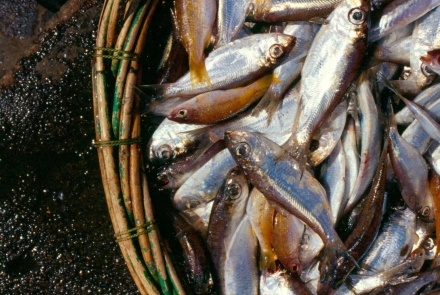
PHOTO: Danumurthi Mahendra https://www.flickr.com/photos/dmahendra/2407607270/
Saving the South China Sea fishery
We need an international legally binding fisheries management regime if we are to prevent catastrophic stock depletion in the South China Sea, Marina Tsirbas writes.
The South China Sea fishery is being depleted at an unsustainable rate and in a destructive manner. The use of cyanide, dynamiting and reef destruction is not uncommon. An estimated 12 per cent of the global fish catch comes from the South China Sea. One study predicts a 50 per cent decline in key fish stocks (as measured by catch) by 2045.
The individual sovereignty based approach in the claimant rich South China Sea is impeding management of this valuable resource. Increased scarcity and fishing nationalism pose the threat of clashes and conflict.
This is something that Australia, the international community and civil society should care about. Australia and other like-minded states should encourage key Southeast Asian states and China to look at a binding mechanism to manage the stocks, drawing on examples elsewhere in the world such as the ASEAN Working Group on Coastal and Marine Environment, the ASEAN Maritime Forum, and others.
A legally binding fisheries management regime would be the optimal result or tool. It would bring in key export destination states (US, Japan, the EU), fishing states (China, Taiwan, Vietnam, Thailand) and coastal states with waters in the region or claims (Malaysia, Vietnam, China, Brunei, Philippines, Indonesia).
Acknowledging that achieving this would not be easy and would take a long time, steps should be taken down this path to build support. Greater transparency highlighting fisheries practices, marine environment destruction and stock depletion in the South China Sea by civil society and others would be useful.
Australia also has valuable expertise to lend in the development of such a framework with its long experience in establishing regional fisheries management organisations in the Western Pacific, Southern Ocean and beyond.
Fish stocks in the South China Sea are already a fraction of what they once were (down to as little as 5 per cent of 1950s levels) and catch per unit effort is a third of what it was 30-40 years ago. Trend lines indicate that we are headed to a collapse of a wide range of fish stocks.
What should be a renewable resource has been made finite.
While whales seem to get most of the positive press and protection in the world’s oceans, some of the South China Sea fish species are making their way onto the International Union for Conservation of Nature’s “red list” of threatened species in the near extinct category. More public focus on fish species and the impact of their disappearance is needed.
Large parts of populations in coastal states (Philippines, Indonesia and Vietnam) rely on fish protein in their diet, and fishing makes a significant contribution to the economies of China, Vietnam, Thailand and Indonesia.
Depleting fishing grounds in the South China Sea will force those who usually fish in those seas further south, including to Australian waters, with implications for the environment and border security. We have already seen increasing numbers of Vietnamese fishing vessels straying into Australian waters in search of fish. They have argued in their legal defence in some cases that China is forcing them out of their traditional fishing grounds.
As fish become scarcer, the risk of increased ‘fishing nationalism’ in the region rises. Domestic political pressure from disenfranchised fishermen or industries provides one of the greatest potential sources of pressure to governments in the region which could lead to conflict. We can see this in reactions by Indonesian President Joko Widodo last year to incursions by Chinese vessels into the Natunas, and Malaysia’s concerns over Thai fishing vessels in its Exclusive Economic Zone (EEZ).
The individual sovereignty based approach is not working to preserve the marine environment and fish sustainability. It is also out of step with the type of measures that have been taken elsewhere in the world to manage fragile marine ecosystems and fish stocks which straddle jurisdictions – and it lacks the urgency that the situation demands. The Food and Agriculture Organisation has estimated that a 50-60 per cent reduction in fishing effort would allow the fish to recover. International momentum on protecting the world’s oceans is gathering.
As a first and urgent step, the fate of the fishery needs to be further publicised. Transparency initiatives related to island-building activities were effective. Transparency around marine environment destruction and over-fishing could effectively be done by civil society and also highlighted in international fora. Another early step would be to consider white-listing or a moratorium by all nations and consumers on imports of fish caught in that region unless they are certified as sustainably caught.
There should be multiparty certification or through a regional organisation to prevent unilateralism. While white-listing or an import moratorium may seem extreme, negotiating any cooperative management or legally binding regime would take years given the lack of trust and competing claims in the region.
Along with trust, Australia would need to build an appreciation of the gravity of the situation sufficient to enable claimants to accept the idea that, without prejudice to sovereignty, the need to cooperate to preserve the marine environment and fisheries, rather than engage in fishing nationalism, is urgent.
Given the strong market forces driving fishing in the South China Sea, the cooperation of regional states and those beyond is needed – key target markets such as Japan (a major fish market), the US and EU would need to take action on imports. Nations like Australia with marine and fisheries management experience could offer capacity-building assistance, ranging from enhanced maritime domain awareness to expertise on sustainable fisheries management, certification and catch accounting.
This is an edited version a new Policy Options Paper from the ANU National Security College, Saving the South China Sea fisheries: time to internationalise. You can read and download the full paper here.
Updated: 1 July 2024/Responsible Officer: Crawford Engagement/Page Contact: CAP Web Team












